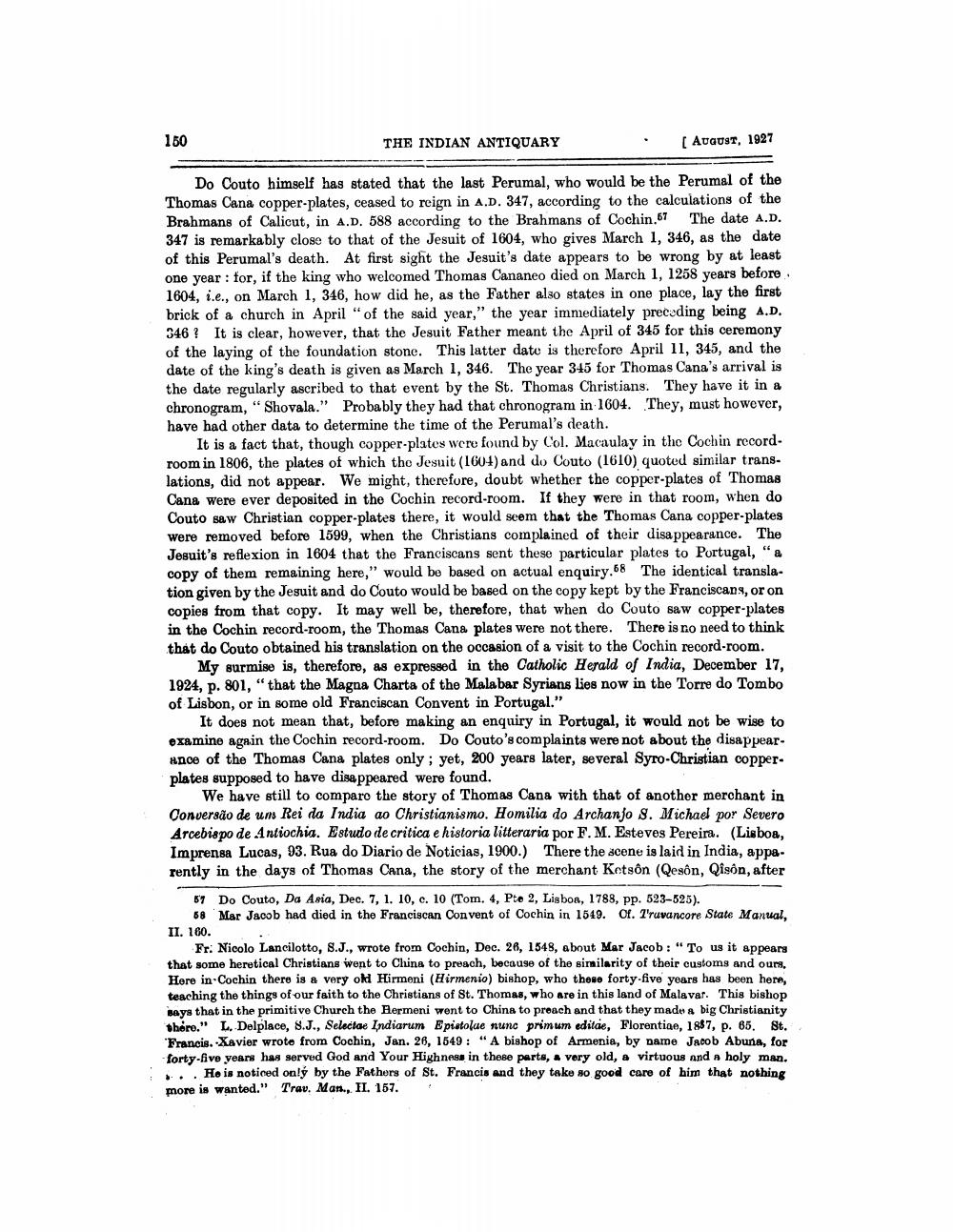________________
150
THE INDIAN ANTIQUARY
[AUGUST, 1927
Do Couto himself has stated that the last Perumal, who would be the Perumal of the Thomas Cana copper-plates, ceased to reign in A.D. 347, according to the calculations of the Brahmans of Calicut, in A.D. 588 according to the Brahmans of Cochin.57 The date A.D. 347 is remarkably close to that of the Jesuit of 1604, who gives March 1, 346, as the date of this Perumal's death. At first sight the Jesuit's date appears to be wrong by at least one year for, if the king who welcomed Thomas Cananeo died on March 1, 1258 years before. 1604, i.e., on March 1, 346, how did he, as the Father also states in one place, lay the first brick of a church in April "of the said year," the year immediately preceding being A.D. 346? It is clear, however, that the Jesuit Father meant the April of 345 for this ceremony of the laying of the foundation stone. This latter date is therefore April 11, 345, and the date of the king's death is given as March 1, 346. The year 345 for Thomas Cana's arrival is the date regularly ascribed to that event by the St. Thomas Christians. They have it in a chronogram, "Shovala." Probably they had that chronogram in 1604. They, must however, have had other data to determine the time of the Perumal's death.
It is a fact that, though copper-plates were found by Col. Macaulay in the Cochin recordroom in 1806, the plates of which the Jesuit (1604) and do Couto (1610) quoted similar translations, did not appear. We might, therefore, doubt whether the copper-plates of Thomas Cana were ever deposited in the Cochin record-room. If they were in that room, when do Couto saw Christian copper-plates there, it would seem that the Thomas Cana copper-plates were removed before 1599, when the Christians complained of their disappearance. The Jesuit's reflexion in 1604 that the Franciscans sent these particular plates to Portugal, "a copy of them remaining here," would be based on actual enquiry.68 The identical translation given by the Jesuit and do Couto would be based on the copy kept by the Franciscans, or on copies from that copy. It may well be, therefore, that when do Couto saw copper-plates in the Cochin record-room, the Thomas Cana plates were not there. There is no need to think that do Couto obtained his translation on the occasion of a visit to the Cochin record-room.
My surmise is, therefore, as expressed in the Catholic Herald of India, December 17, 1924, p. 801, "that the Magna Charta of the Malabar Syrians lies now in the Torre do Tombo of Lisbon, or in some old Franciscan Convent in Portugal."
It does not mean that, before making an enquiry in Portugal, it would not be wise to examine again the Cochin record-room. Do Couto's complaints were not about the disappearance of the Thomas Cana plates only; yet, 200 years later, several Syro-Christian copperplates supposed to have disappeared were found.
We have still to compare the story of Thomas Cana with that of another merchant in Conversão de um Rei da India ao Christianismo. Homilia do Archanjo S. Michael por Severo Arcebispo de Antiochia. Estudo de critica e historia litteraria por F. M. Esteves Pereira. (Lisboa, Imprensa Lucas, 93. Rua do Diario de Noticias, 1900.) There the scene is laid in India, apparently in the days of Thomas Cana, the story of the merchant Ketsôn (Qesôn, Qisôn, after
57 Do Couto, Da Asia, Dec. 7, 1. 10, c. 10 (Tom. 4, Pte 2, Lisboa, 1788, pp. 523-525).
58 Mar Jacob had died in the Franciscan Convent of Cochin in 1549. Of. Travancore State Manual, II. 160.
Fr. Nicolo Lancilotto, S.J., wrote from Cochin, Dec. 26, 1548, about Mar Jacob: "To us it appears that some heretical Christians went to China to preach, because of the similarity of their customs and ours, Here in Cochin there is a very old Hirmeni (Hirmenio) bishop, who these forty-five years has been here, teaching the things of our faith to the Christians of St. Thomas, who are in this land of Malavar. This bishop says that in the primitive Church the Hermeni went to China to preach and that they made a big Christianity there." L. Delplace, S.J., Selectae Indiarum Epistolae nunc primum editae, Florentiae, 1887, p. 65. St. Francis. Xavier wrote from Cochin, Jan. 26, 1549: "A bishop of Armenia, by name Jacob Abuna, for forty-five years has served God and Your Highness in these parts, a very old, a virtuous and a holy man. ... He is noticed only by the Fathers of St. Francis and they take so good care of him that nothing more is wanted." Trav. Man., II. 157.




